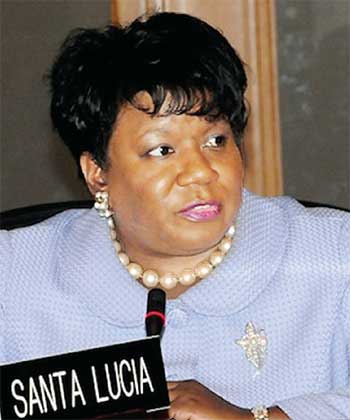THE Government of St. Lucia has won a case against a former Ambassador over breach of contract relating to an entitlement to be paid in lieu of vacation leave.

Sonia Johnny, who was St. Lucia’s Ambassador to the United States and the Organization of American States (OAS) from November 1997 until her resignation on March 7, 2007, sued the government for failing to pay her vacation leave, claiming she had a right to be compensated for leave which she did not use during her period of employment.
She further claimed that the practice of not making arrangements and rolling over the accumulated leave from contract to contract implied a term in the contract that if she was unable to take her leave, it would be forfeited and, therefore, entitled to be paid for it.
Senior Crown Counsel, Jan Drysdale, who represented the government, admitted that Johnny was paid in lieu of notice sometime in September 2000 but asserted that there was no right to receive payment in lieu of notice since this was the sole discretion of the Crown.
He also asserted that accumulation of leave was not automatic and is contrary to the expressed provisions of Johnny’s contracts of employment which existed and that Johnny was obligated by the terms of her contract to take her leave during the currency of the contract and if she did not, the leave was liable to be forfeited. He also denied that Johnny was entitled to the relief she was seeking.
Johnny signed three contracts with the Government of St. Lucia, the first one on November 17, 1997 for a period of three years. She signed the second on August 16, 2000 for another three-year period commencing November 17, 2000 and the third on March 21, 2003 for a period of two years.
Court papers claimed that Johnny did not provide evidence of a renewal of contract for the period 2005 to 2007. However, this was not disputed as it appeared that Johnny remained in the employment of the government on the same terms and conditions as the third contract and that leave entitlement must be taken during the tour of service.
Johnny, in her witness statement filed on April 30, 2013, gave evidence that during the years of her appointment as Ambassador, she was unable to take the full quota of her vacation leave as per her contracts as her duties as Ambassador were such that in order to perform them effectively, she was required to serve her country on a 24-hour basis and that at no time were arrangements put in place to facilitate her leave.
The case was heard at least four times this year in the High Court, finally ending earlier this month before Justice Kimberly Cenac-Phulgence, who had to determine whether Johnny had established a contractual right to accumulate vacation leave from contract to contract, whether there was an implied term of the contract that Johnny would be paid for her leave if she was unable to take it, and whether Johnny had established a contractual right to be paid in lieu of vacation.
According to Justice Cenac-Phulgence, the contracts for the periods of Johnny’s employment as Ambassador were clear and unambiguous and made no reference to accumulation of leave from contract to contract.
“I have set out the relevant clause at paragraph 4 thereof and it is clear from this clause that vacation leave must be taken during the tour of service. The provision is clear. There is no indication that vacation leave is to accumulate from contract to contract. I accept the defendant’s submission that there is no provision on the express terms of the contracts that vacation leave not taken during the currency of a contract would be preserved,” she said in her judgment.
In determining whether there was an implied term of the contract that Johnny would be paid for her leave if she was unable to take it, the judge noted that a term cannot be implied to oust an express term of contract.
She also said that Johnny’s case had been difficult to unravel because it would appear that on one hand, she was relying on the practice of rolling over leave and of not making arrangements for her to take her leave to imply a term for payment in lieu of leave into the contract while she appears to be saying that the term is implied by virtue of the fact that she was paid in lieu of leave in 2000.
The high court judge, in conclusion, stated that there was no contractual right to payment in lieu of leave either on the express terms of the contract or by implication based on the practices identified by Johnny which, on the evidence, had not been proven.
Justice Cenac-Phulgence, therefore, dismissed Johnny’s claim, stating that the prescribed costs of $220,395.60 are awarded to the government in the sum of $30,049.45
Appearing on behalf of Johnny were Cynthia Hinkson Ouhla and Natalie DaBreo.















